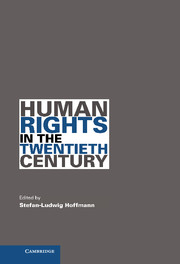Book contents
- Frontmatter
- Contents
- Notes on Contributors
- Acknowledgments
- Introduction: Genealogies of Human Rights
- Part I The Emergence of Human Rights Regimes
- Part II Postwar Universalism and Legal Theory
- Part III Human Rights, State Socialism, and Dissent
- 7 Embracing and Contesting
- 8 Soviet Rights-Talk in the Post-Stalin Era
- 9 Charter 77 and the Roma
- Part IV Genocide, Humanitarianism, and the Limits of Law
- Part V Human Rights, Sovereignty, and the Global Condition
- Index
- References
9 - Charter 77 and the Roma
Human Rights and Dissent in Socialist Czechoslovakia
Published online by Cambridge University Press: 05 June 2012
- Frontmatter
- Contents
- Notes on Contributors
- Acknowledgments
- Introduction: Genealogies of Human Rights
- Part I The Emergence of Human Rights Regimes
- Part II Postwar Universalism and Legal Theory
- Part III Human Rights, State Socialism, and Dissent
- 7 Embracing and Contesting
- 8 Soviet Rights-Talk in the Post-Stalin Era
- 9 Charter 77 and the Roma
- Part IV Genocide, Humanitarianism, and the Limits of Law
- Part V Human Rights, Sovereignty, and the Global Condition
- Index
- References
Summary
In November 1990 thirty-five heads of state gathered in Paris to sign the “Charter for a New Europe,” a declaration that celebrated the triumph of democracy and human rights after forty years of communist rule in Eastern Europe. The Conference on Security and Cooperation in Europe, which produced the Paris Charter, has been credited with supplying a “normative framework conducive to the peaceful demise of Communism.” Despite its celebratory tone, the Charter also warned of dangers ahead for the region’s most vulnerable groups, condemning “totalitarianism, racial and ethnic hatred, anti-Semitism, xenophobia and discrimination against anyone as well as persecution on religious and ideological grounds,” while recognizing the “particular problems of Roma (Gypsies).” References to Roma or anti-Semitism were unprecedented in such an international declaration. Only months after the dramatic revolutions that swept away the Eastern European communist regimes in 1989, the Paris Charter was viewed with immense optimism by observers at the time as a potential constitution for a newly democratic Europe, and the CSCE suddenly became the “sexiest acronym in international diplomacy.”
The Paris Charter linked democracy, human rights, and conflict prevention in post-communist Europe to the protection of minorities, devoting more than a dozen paragraphs to minority rights for the first time in an international statement since the Second World War. The reappearance of minority rights in declarations by international institutions, such as the CSCE, UN, and Council of Europe, at the same time as the “rights revolutions” that saw the fundamental refashioning of rights in post-communist countries, is commonly attributed to the resurgence of ethnic nationalism that followed the collapse of the socialist dictatorships in Eastern Europe. This chapter proposes a different argument and draws on previously inaccessible archives to show how “rights-talk” – including the rights of individuals and minorities – was used by a variety of social actors during the last two decades of socialist rule. The chapter focuses on debates about the human rights of Roma in Czechoslovakia among dissidents, social workers, Romani activists, Communist Party officials, high-level civil servants, and international human rights organizations during the era of “normalization,” from the defeat of the Prague Spring to the Velvet Revolution of 1989. By reconstructing these debates, this chapter seeks to understand how the discourse of individual human rights and nondiscrimination, which formed the core of the international human rights regime established after the Second World War, was confronted by a revived emphasis on minority rights and the role of the interventionist state in guaranteeing their implementation. In so doing, it also hopes to challenge triumphalist historical accounts that view the 1989 revolutions as a victory for liberal human rights over the discredited concept of “socialist rights.”
- Type
- Chapter
- Information
- Human Rights in the Twentieth Century , pp. 191 - 212Publisher: Cambridge University PressPrint publication year: 2010

